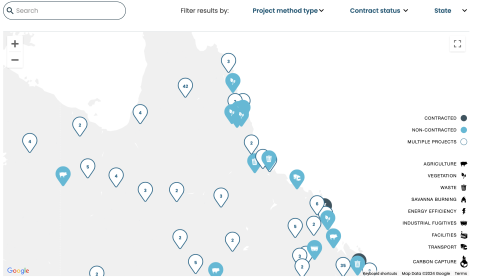What is the Australian Carbon Credit Unit Scheme?
The Australian Carbon Credit Unit (ACCU) Scheme encourages people and businesses to run projects that reduce emissions or store carbon, for example by:
- using new technology
- upgrading equipment
- changing business practices to improve productivity or energy use
- changing the way vegetation is managed.
Australian carbon credit units
How to participate

Project and contract register
Use the ACCU Scheme project and contract register to find out more about the projects being run in Australia.
Popular topics
Eligibility for the ACCU Scheme
ACCU Scheme methods
Understanding carbon abatement contracts
How it works
Under the ACCU Scheme, participants run projects that reduce or avoid greenhouse emissions (emissions avoidance) or remove and store carbon from the atmosphere (sequestration). Participants can earn one ACCU for every tonne of carbon dioxide equivalent (t CO₂-e) emissions their project stores or avoids.
Participants can sell ACCUs on the secondary market or to the Australian Government by entering a carbon abatement contract.
On the secondary market, private buyers purchase ACCUs to voluntarily offset their emissions or meet compliance requirements.
Buyers also include Australia's highest emitting facilities under the Safeguard Mechanism. They're required to keep emissions below set baselines and can do this by buying and surrendering ACCUs. Safeguard facilities can also earn ACCUs by running their own projects.
Who can participate
Individuals, sole traders, companies, local, state and territory government bodies and trusts can participate in the ACCU Scheme.
For example, industry, business, landholders, farmers and First Nations people can run projects to reduce emissions, improve energy efficiency, avoid emissions of methane and nitrous oxide, or convert methane and more. They can also store carbon or avoid emissions from agricultural activities, including:
- reforestation
- revegetation
- savanna burning
- managing beef cattle herds
- restoring blue carbon ecosystems
- restoring rangelands
- improving soil carbon
- protecting native forest or vegetation at risk of clearing.
Find out more about the different project methods.
Non-carbon benefits
As well as earning ACCUs that can be sold to generate income, there are other key benefits for running projects.
These can be environmental, economic, social and cultural benefits and include things like:
- improving water quality, reducing soil erosion and reducing salinity through revegetation activities
- improving farm resilience and sustainability by diversifying land use
- improving farm productivity by replenishing soil's carbon content
- valuing traditional knowledge of fire management, providing economic opportunities for First Nations communities and reducing late season wildfire damage in savanna areas
- increasing biodiversity and expanding habitats for native species
- lowering emissions and reducing energy costs for Australian businesses.
Our role
Independent review of the integrity of Australian carbon credit units
We welcome the report of the Independent Review of ACCUs.
The Australian Government appointed an independent panel to review the integrity of ACCUs under the ACCU Scheme.
The panel concluded that the ACCU Scheme arrangements are essentially sound, incorporating mechanisms for regular review and improvement. The panel recommended a number of changes to clarify governance, improve transparency, facilitate positive project outcomes and co-benefits, and enhance confidence in the integrity and effectiveness of the scheme.
We look forward to assisting the Australian Government with its implementation.
Find out more about the ACCU review on the Department of Climate Change, Energy, the Environment and Water's website.
We administer the ACCU Scheme by:
- assessing project applications for registrations
- assessing project reporting
- ensuring scheme compliance
- issuing ACCUs
- managing carbon abatement contracts
- publishing the ACCU Scheme project and contract registers.
The Department of Climate Change, Energy, the Environment and Water oversees the policy of the ACCU Scheme. Read the policy intent on the department’s website.
Case studies
Turning soil into wine: enticing soil carbon farming in vineyards
Arnhem Land Fire Abatement
Ploughshare revegetation
The Reed family restored their unproductive bushland to its natural ecosystem. It's now fully vegetated and producing carbon credits.
Beef cattle herd management
Australian cattle producers are adopting eco-friendly practices to cut their emissions.
Latest ACCU news
View all newsarrow_right_altClean Energy Regulator commences legal proceedings over alleged unlawful sharing of ANREU login details.
04 April 2024Give your feedback on proposed changes to audit requirements for the ACCU Scheme plantation forestry method
02 April 2024CER commences work on the Nature Repair Market
19 February 2024Independent review provides confidence in the integrity of human-induced regeneration projects
15 December 2023
